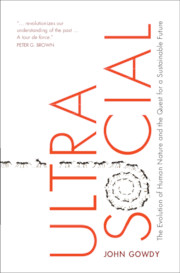Crossref Citations
This Book has been
cited by the following publications. This list is generated based on data provided by Crossref.
DeSilva, Jeremy M.
Traniello, James F. A.
Claxton, Alexander G.
and
Fannin, Luke D.
2021.
When and Why Did Human Brains Decrease in Size? A New Change-Point Analysis and Insights From Brain Evolution in Ants.
Frontiers in Ecology and Evolution,
Vol. 9,
Issue. ,
Gowdy, John
2021.
Handbook of Climate Change Mitigation and Adaptation.
p.
1.
Gowdy, John
2022.
Handbook of Climate Change Mitigation and Adaptation.
p.
289.
Adžić, Slobodan
2022.
A Millennium of Peace and Development without Wars in Human History: Vinča Culture.
Peace Review,
Vol. 34,
Issue. 4,
p.
596.
Wilson, David Sloan
Madhavan, Guru
Gelfand, Michele J.
Hayes, Steven C.
Atkins, Paul W. B.
and
Colwell, Rita R.
2023.
Multilevel cultural evolution: From new theory to practical applications.
Proceedings of the National Academy of Sciences,
Vol. 120,
Issue. 16,
Wilson, David Sloan
and
Snower, Dennis J.
2024.
Rethinking the Theoretical Foundation of Economics I: The Multilevel Paradigm.
Economics,
Vol. 18,
Issue. 1,
Søgaard Jørgensen, Peter
Jansen, Raf E. V.
Avila Ortega, Daniel I.
Wang-Erlandsson, Lan
Donges, Jonathan F.
Österblom, Henrik
Olsson, Per
Nyström, Magnus
Lade, Steven J.
Hahn, Thomas
Folke, Carl
Peterson, Garry D.
and
Crépin, Anne-Sophie
2024.
Evolution of the polycrisis: Anthropocene traps that challenge global sustainability.
Philosophical Transactions of the Royal Society B: Biological Sciences,
Vol. 379,
Issue. 1893,





